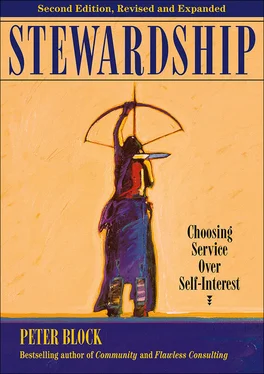Block has added fascinating and important new material in this second edition: a new introduction that surveys, with Block’s compelling insight and mind-opening perspective, what has changed and what has not changed in the world in the past twenty years – and how the ideas in this book are needed now more than ever; a new chapter on “stewardship for the common good” that shows how the principles in the book apply not just to individuals and organizations but also to communities and to society in general; and new examples of stewardship in action.
But this new material is just icing on the cake. What I especially love about Stewardship is that it is the rare book that is just as relevant and radical today as it was the day it was written, or even more so. This is a sign that Peter Block hit bedrock with the concepts in this book.
One can open the book almost anywhere and find pithy, memorable observations that turn conventional thinking on its head and open our minds to new ways of seeing the world around us. Consider, for example, this comment in chapter 12 Конец ознакомительного фрагмента. Текст предоставлен ООО «ЛитРес». Прочитайте эту книгу целиком, купив полную легальную версию на ЛитРес. Безопасно оплатить книгу можно банковской картой Visa, MasterCard, Maestro, со счета мобильного телефона, с платежного терминала, в салоне МТС или Связной, через PayPal, WebMoney, Яндекс.Деньги, QIWI Кошелек, бонусными картами или другим удобным Вам способом.
, “Cosmetic Reform: When the Disease Becomes the Cure”: “Appraisal is a process of coercion. We also call it a reward system. Yet if it is a reward system, it is a punishment system too.”
Block provides such a foundational and far-reaching rethinking of leadership, power, purpose, governance, and participation in organizations and communities that the ideas of this book will continue to change our thinking for decades to come. The book’s original and central concepts – stewardship, partnership, service, avoiding class systems, and many others – are so profound and universally relevant that they will challenge readers’ beliefs and practices in any place and time, now and in the future.
Berrett-Koehler is unusual as a publishing company because we consciously and actively seek to learn from the books we publish and to use the ideas in those books to improve how we run our business, serve our customers, partner with authors, and work with all of our stakeholders. Without any doubt, Stewardship has had more impact on Berrett-Koehler than any other of the more than five hundred books we have published.
For twenty years I have given each new BK employee a copy of Stewardship and asked her or him to read it. But that is only the tip of the iceberg of this book’s influence on our company.
Its influence started in 1992, even before Stewardship was published, when I was working with Peter Block on the manuscript and sought to incorporate its ideas into how Berrett-Koehler was conceived and organized. In fact, the founding concept of Berrett-Koehler was based on stewardship, as described in our first catalog in the spring of 1992:
If I were to choose one word to describe our vision, it would be “stewardship.” By this I mean a deep sense of responsibility to administer the publishing company for the benefit of all of our “stakeholder” groups – authors, customers, employees, suppliers and subcontractors, owners, and the societal and environmental communities in which we live and work. Each of these groups contributes to the success of our publishing venture, and each has a “stake” or investment in its success, whether that investment is time, talent, money, or other resources.
This is still our guiding concept today for all that we do at Berrett-Koehler.
There is a story behind why the ideas of Stewardship fell on such fertile ground at Berrett-Koehler. Before founding BK, I had been president of Jossey-Bass Publishers in San Francisco during its challenging transition from being an independent company to becoming part of the media empire of Robert Maxwell (who at the time was a chief rival of Rupert Murdoch) and being placed as a division of Maxwell Communications Corporation.
I quickly discovered that our new corporate parent was calling all the shots, and none of the other Jossey-Bass stakeholders really mattered. Not the many Jossey-Bass employees who had been central to the company’s success for ten to twenty years of faithful employment there; not the authors with whom Jossey-Bass had longstanding relationships, some of whom were original authors of the company; not the many suppliers and service providers on whom the company depended, including some who had supported the company from its founding. All that really mattered was the call from my boss in New York City – a bureaucrat who seemed to have no real understanding of our company or even how to work collaboratively and intelligently with us.
What was especially troubling about this new balance of power was that there was nothing our new corporate parent was doing that made Jossey-Bass more successful or productive or profitable. Yet, without adding any value, the corporate parent presumed to unilaterally govern our company. It was easy to see that something was deeply wrong with this equation.
And so the ideas in the Stewardship manuscript spoke directly to my corporate experience. We set out to build Berrett-Koehler Publishers on a different foundation. This started with the founding concept quoted above and was later reinforced by our articulation of our mission as “Creating a World That Works for All.” It has continued with a host of BK practices directly inspired by the concepts in Stewardship .
One of these core practices is to avoid a class system in our management, employment, and compensation practices. This begins with involving all employees (and, when appropriate, other stakeholders) in making major company decisions. And whereas, as Block writes in Stewardship , most organizations have two compensation systems, with the executive compensation system designed to pay those at the top as much as possible and the employee compensation system designed to control costs, Berrett-Koehler has just one compensation system for everyone in the company. Furthermore, this compensation system is designed to pay a living wage to everyone and to minimize the disparity between the lowest and highest paid employees; accordingly, the highest paid employee (me) earns less than five times what the lowest paid full-time employee earns, including bonuses. All employees are involved in decisions about changes in the compensation system. And we have taken another page out of Stewardship by banishing secrecy: all employees know where every employee is on the compensation scale, and all employees receive full financial reports each month of how the company is doing and where money is being spent.
Another area where Berrett-Koehler has sought to live by the ideas in Stewardship is by following a partnership approach in our relationships with authors. This approach struck pay dirt right from the beginning of our company with our distinctive publication agreement, which, in the words of one early observer, “creates incentives for both parties to contribute and do well, whereas most contracts are contingencies for when things go wrong, legal protection against foul-ups.” The publication agreement gives authors more involvement in deciding the title, cover design, and interior design of the book than is normally the case in the publishing world. Various other clauses in the agreement also support a partnering relationship with authors in lieu of the publisher control clauses in most agreements. And most radical of all, the agreement yields to authors the ultimate power by giving them the right to terminate the agreement “if, for any reason, the Author is not satisfied, in the Author’s sole judgment, with any aspect of the relationship with the Publisher or with the Publisher’s performance in any aspect of publishing and selling the Work.” This turns on its head the normal hierarchy between publishers and authors.
Читать дальше












